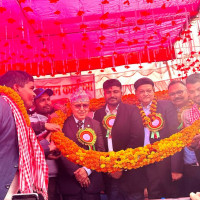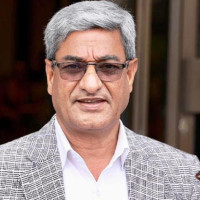- Friday, 26 December 2025
Financial shortages affecting quality education in Sudurpashchim schools
By Prakash Bikram Shah,Dhangadhi, Aug. 7: Community schools in Sudurpashchim Province are facing a severe financial crisis, impacting the quality of education in the region.
The learning experience of students is negatively impacted because of the lack of classrooms, teachers and sufficient educational materials.
The problem has been more noticeable in community schools of rural areas compared to those in urban. Despite investments from all three levels of government in the education sector, the community schools of the province continue to face challenges.
The federal government has announced that every citizen will be entitled to mandatory and free education up to the basic level and free education up to the secondary level. However, parents have raised concerns as community schools continue to impose fees under various headings.
The Sudurpashchim government on June 16 unveiled its annual budget of Rs. 29.26 billion for the fiscal year 2023/24. Of the budget, Rs. 2.29 billion has been allocated for several categories under the education heading such as salary and allowances, uniforms, and building construction among others.
Similarly, the provincial government has allocated Rs. 900 million for diverse educational programmes.
The financial data of the provincial government for three consecutive years shows that there has been a gradual decrease in the budget in the education sector.
The province government had set aside Rs. 3. 16 billion for education in the fiscal year 2021/22 and Rs. 4.05 billion.
As stated in the Red Book of the Sudurpashchim Provincial Ministry of Economic Affairs, of the total Rs. 4.05 billion allocated for the education sector in the last fiscal year, only Rs. 2.46 billion was set aside for the education programme.
Similarly, in the current fiscal year, the provincial government has allocated Rs. 15 million to implement the Chief Minister's Educational Infrastructure Development and Quality Improvement Programme.
The allocated budget will be utilised to establish model schools to meet the specific demands and requirements of the local communities.
Additionally, the allocated funds will be spent to improve the quality of education and generate expertise in the education sector in partnership with both the provincial government and local authorities.
Likewise, a budget of Rs. 80 million has been separated to implement mid-day meal programmes in schools in cooperation with all three levels of government. The funds will also be used to create a model child development centre at each local level with the objective of improving the health and nutritional well-being of children in the region.
Likewise, Rs. 48.6 million has been allocated for technical education scholarships with the aim of increasing access to higher education and medical studies for the target groups.
This scholarship will benefit various groups, such as children from underprivileged communities, families of martyrs and missing persons, disabled individuals, Dalits, former-bonded labourers, and marginalised communities.
According to the budget statement, Rs. 16 million has been designated for information technology and research-based training to enhance teachers' skills. This programme is expected to improve the overall educational quality..
Bhuwan Joshi, the information officer of the Ministry of Social Development, said the budget allocated by the provincial government for the construction of school buildings, hostels, toilets, and playgrounds is being implemented through the Social Development Office.
Attraction towards private schools
Likewise, the deteriorating quality of education in community schools has resulted in a significant rise in private schools throughout the province.
Topendra Shah, President of the Private and Residential School Organisation (PABSON) of Kailali, said the increase in private schools has resulted in a proportional rise in investments in the education sector.
He added that there was an approximate investment of Rs. 1 billion in private schools across the province. "The investment in private schools is seeing a gradual increase each year," said Shah.
Shah said the average yearly expenditure per student in private schools ranged from Rs. 25,000 to Rs. 30,000 depending on the school.
PABSON Kailali reported that students in the expensive private schools in the province are spending approximately Rs. 40,000 to 60,000 per year.
Educational institutions in Sudurpashchim
As per the National Census, 2021, the literacy rate in Sudurpashchim Province stands at 76.2 per cent.
In the academic year of 2021, Sudurpashchim Province had a total of 1,908 community schools operating at the basic level (grades 1 to 5), 703 at the lower secondary level (grades 1 to 8), 441 at the secondary level (grades 1 to 10), and 444 at the higher secondary level (grades 1 to 12).
Additionally, the province had 189 private schools operating at the basic level, 255 schools at the lower secondary level, 179 schools at the secondary level and 67 at the higher secondary level.
As per the economic survey published by the Ministry of Economic Affairs, Sudurpashchim Province is home to 70 community colleges and 25 private colleges offering education up to graduation level. Additionally, the province has 18 community colleges and three private colleges providing education up to the postgraduate level.
Students' numbers in decline
The academic year 2022, witnessed a decline of a total of 2.13 per cent of students in the province. Similarly, the number of students studying at basic levels (grades 1 to 8) declined by 3.97 per cent.
During the same academic year, the province had a total of 980,110 students, with 740,287 students enrolled in grade1 to 8 and 230,823 students in grades 9 to 12.
Out of the total student in the province, 20 per cent are enrolled in private educational institutions, while the remaining 80 per cent are attending community-based schools and colleges.
Similarly, in the academic year 2021, the province had a total of 25,424 teachers working in both community and private educational institutions. Of them, 15,501 were male and 9,923 were female teachers.
Of all the teachers in the province, 76.38 per cent are employed in community-based schools, while 23.63 per cent are working in the private sector.














